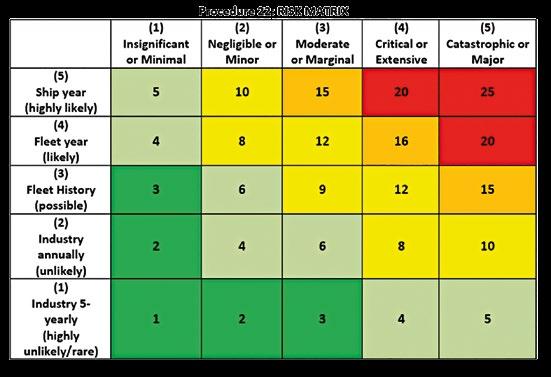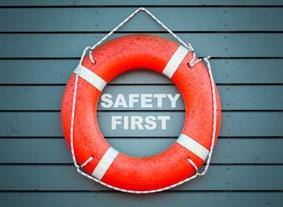
5 minute read
Safety First
from Wavelength #80
MESSAGE FROM THE DPA: The time has come for SMS Simplification!
Dear seafarers, Our SMS was born back in 1996! At first it was a welcome novelty for onboard routines, and proved to be quite useful. For many years, we have been trying to keep it simple, but somewhere on the road, we have apparently lost our way. The huge number of new requirements emerging at the "speed of light" has not helped us. The fact that various regulatory and industry bodies could not find a common strategy for regulations was also a major drawback. Now, after all these years, we have our present SMS: bulky, not very user friendly, often duplicated in several manuals and using a language that is no longer compatible to your daily needs and tasks. I am sure you can still find your way around it, but this is because most of you have been with the Company for so many years. In the past 25 years shipping has evolved, vessel technology has evolved, the seafarer has evolved – it is also time for our Elli Moretti SMS to evolve. I know we are used to it, but we have to change! Now is the time for me to ask myself: "Can this SMS still help you get home safe?" The answer is, of course, yes, but we can make it better! It should be less complicated, clear, easy to use and swift enough to get you the crucial information you might need in demanding times. A team of 9 shore employees, including myself, have been trained and the project has commenced! It is not going to be easy and we are not so sure how long it will take, but with your help, I am sure we will have an outcome to be proud of! I'll keep you posted! I wish you safe voyages and safe return home, Elli Moretti
Advertisement
Do not allow external pressure to influence compliance with procedures
(source: Goal Zero LFI – Learning from Incidents)
How and why it happened
The vessel was scheduled for a crew change concurrent with loading MGO. The incoming staff were familiar with the vessel. The outgoing staff had set up the fuel system ready to receive the MGO. The operators ashore wanted to expedite the bunkering operation to clear the berth as soon as possible. The incoming staff commenced the bunkering operation with the intention of loading 20 m³ (168 US bbls) into the first reception tank. Approximately 10 minutes into the loading operation, MGO was observed issuing from the tank’s air vent and spilling overboard into the harbour. The operation was stopped and pollution response equipment was deployed to contain and recover the spill. Findings: •The incoming staff did not check the fuel system prior to starting the operation. The tank valve of a previously loaded fuel tank was not fully closed. This permitted MGO from the full tank to backflow into the empty tank being loaded. •External pressure was placed on the vessel from the operators ashore to expedite the bunkering operation in
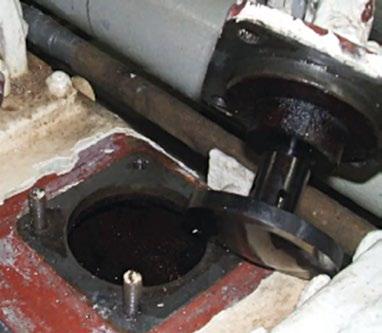
Transfer checklist incorrectly marked as completed
order to clear the berth. The filling rate accepted was higher than the rate agreed prior to the transfer. •Tank soundings were not taken as there was a concern that, owing to the high filling rate, MGO could spray from the sounding pipe and splash onto a nearby hot generator exhaust, leading to a fire.
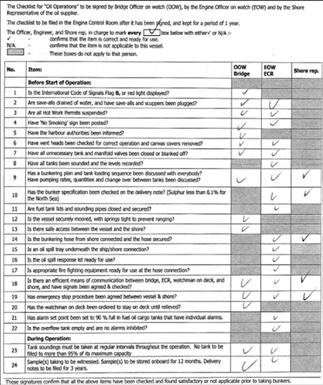
Tank valve found in good condition
- Reflection: Questions for discussion How is it demonstrated to you that handover checks, especially for critical tasks, are carried out thoroughly? What do you do to make sure external factors do not influence compliance with procedures? How do you make sure repeat checks to confirm key actions are undertaken safely? How do you empower staff to stop an operation when they find things are not going as planned?
Tank Overflow & Cargo / Bunker Spills
(source CLIP # 01-2022 from IMT)
IMT have observed a series of Incidents related to loss of containment during cargo operations and bunker spills from receiving vessels.
An overview of certain events leading to incidents
INCIDENT # 1: Cargo and water release to deck during discharge operation During cargo discharge operations, efforts to rectify a small leak by adjusting a stripping line cam-lock coupling turned into a significant spill due to not verifying the valve position. ROOT CAUSES #1 - Improper checks - SWO (Stop Work Obligation) not used INCIDENT # 2: Loss of containment after completion of stripping operation Upon completion of discharge and stripping operations, whilst the crew were disconnecting the stripping hose, there was a sudden pressure release followed by cargo spray on deck near the manifold area.
ROOT CAUSES #2 - Failure to follow procedures - 2-person check not followed
INCIDENT # 3: Overflow of bunker tank due to inadequate planning of bunker operation
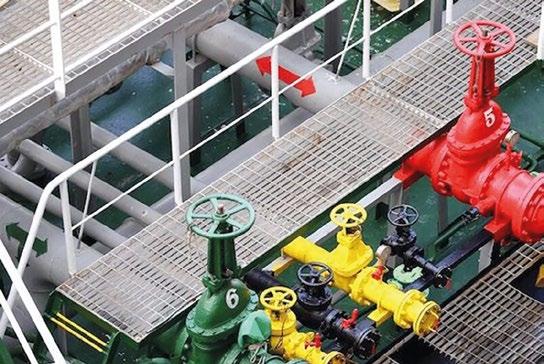
Final volumes in tanks were incorrectly calculated during the planning stages. There was a last- minute attempt to accommodate the volume of bunkers.
ROOT CAUSES #3 - Lack of planning - Lack of monitoring - SWO (Stop Work Obligation) not used
INCIDENT # 4: Loss of containment due to tank opening and tank valve left open The tank overflowed due to the valve being left partially open and the manhole covers not being closed.
ROOT CAUSES #4 - Failure to follow procedures - 2-person check not followed TRUST: TEN Really Useful Safety Tips Tips to avoid tank overflow during Cargo or Bunker operations
1. Plan & Monitor! - Cargo/bunker operation planning should include critical stages to be monitored. 2. Risk Assessment! – It should be accurate AND relevant to the
SPECIFIC cargo or bunker operation. 3. Risk Assessment! - Refresh your RA in case of unplanned last minute changes during cargo/bunker operations.
4. SIMOPS! - Consider any other operation at the same time that may affect cargo or bunkering ops. 5. Tool box talks! - Discuss detailed responsibilities and give direction at all levels until completion of the operation. 6. Intervene! - Promote SWO (Stop
Work Obligation) or shut down cargo/bunker operations. 7. Test your Scuppers! - Scuppers are the last barrier before a spill into water. 8. Near Misses! – Report any near misses in relation to cargo and bunker activities. 9. Goal Zero! – Discuss the Human
Element affecting similar incidents. 10.Master audits! - Your internal cargo and bunker operation audit must be actual and detailed,and always carried out at the time of the operation.
